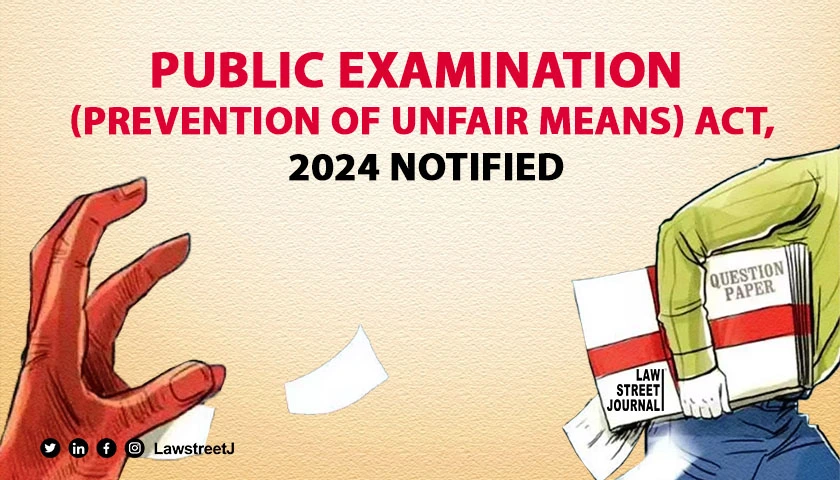Amid a number of incidents of paper leakages, the Union government on Friday notified the Public Examination (Prevention of Unfair Means) Act, 2024, which provided stringent penalty, including a maximum jail term of 10 years and Rs one Cr fine for those indulging in such cases.
According to a Gazette notification, the Act would come into force on June 21, 2024.
It is to be noted that the question paper leak is a malaise which has made a serious question mark on the reputation, purity, sanctity and credibility of the examinations conducted by the central agency like National Testing Agency and various other organisations.
Taking note of the long felt need for stringent laws to prevent this malaise, Parliament enacted Public Examinations (Prevention of Unfair Means) Act, 2024. The Act received the assent of the President on February 12, 2024. The Act would come come into force June 21 as notified by the Central Government.
Section 2 of the Public Examinations (Prevention of Unfair Means) Act, 2024, was incorporated to supplement many a lacunae in the IPC by defining several technical terms such as service provider, computer network, communication device, etc.
Section 3 of the Act defined unfair means and offences. Section 10 provided for punishment with a minimum imprisonment of 3 years. Section 10(2) provided for imposition of Rs one crore as punishment in addition to the cost of re-examination to be recovered.
Where an offence is committed with the connivance of the Senior Manager or the Person-in-charge of the service provider firm, the imprisonment shall be for a term which may extend to 10 years with a minimum imprisonment of 3 years and fine of Rs one crore.
The Act recognised leaking of question papers and other malpractices in the conduct of examinations as an organised crime. The Act mandated that an officer, not less than the rank of a deputy Superintendent of Police or Assistant Commissioner of Police, would investigate such cases.
The Public Examinations (Prevention of Unfair Means) Act, 2024, is expressly stated to be in addition to and not in derogation of any other law in force by virtue of Section 15 thereof.
Under the Act the power of making rules to carry out the provisions of the Act was vested in the Central Government. As per Section 17 of the Act, the rules so made has to be placed before both Houses of the Parliament. Since the Act has been notified, it is now incumbent upon the Government to frame rules and place it before both houses of the Parliament for its approval.
The newly notified Act makes all offences cognizable, non-bailable, and non-compoundable.
NEET UG 2024 held on May 5, was marred with allegations of paper leakage with Bihar, Delhi and Gujarat police having lodged separate FIRs. Several candidates and students organisations demanded re-test but the central government is yet to take a decision in this regard, though it has set up panels to look into it. Subsequently, the UGC NET, held this month, was cancelled after similar charges of irregularities were made.







![Centre tells Supreme Court scrapping NEET exam would seriously jeopardize lakhs of candidates [Read Centres Affidavit]](/secure/uploads/2024/07/lj_8155_Centre_opposed_NEET_exam.webp)






